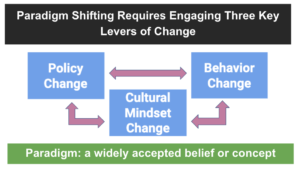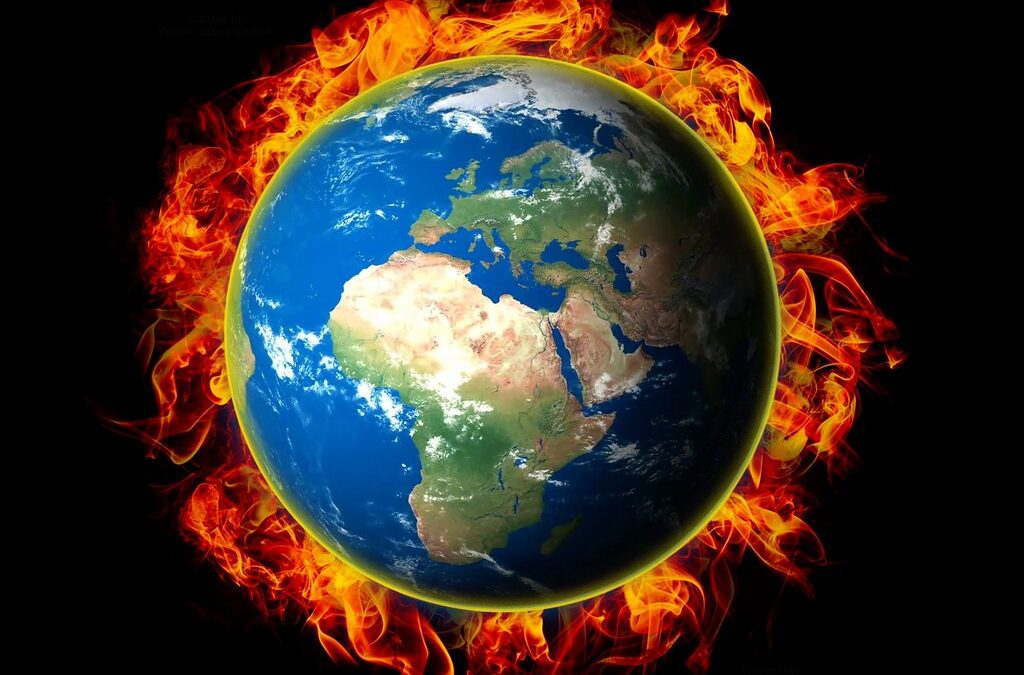A majority of Americans are alarmed or concerned about climate change, but many are unsure how climate change impacts their everyday lives, as well as the roles and responsibilities in their professional lives.
School communities are already experiencing the impacts of climate change (e.g., wildfires, public power shut-offs, poor air quality, high heat days, water shortages, flooding, transportation disruptions, etc.) and navigating challenges related to these impacts (e.g., disruptions to learning and play and school closures).
Parents (over 80%) and teachers (over 86%) want climate change and environmental issues to be taught in schools. Yet, many educators feel overwhelmed or even confused about the realities of climate change and how to fit this into a long list of priorities and activities. Other educators express guilt that they are not doing enough and many are concerned about the increase in Eco-Anxiety (or climate despair) in children and youth. The vast majority of education leaders do not have a clear understanding that they need to be involved in the climate leadership landscape. Despite these challenges, the K-12 education sector has a great opportunity to play a role in the most important teachable moment humanity has ever experienced: surviving and thriving in the climate era.
The IPCC Sixth Assessment Report has Serious Implications for K-12 Educators
An important starting point is for education leaders to understand the significance of the findings in the United Nations Intergovernmental Panel on Climate Change (IPCC) Sixth Assessment Report. The first installment, also known as the “Physical Science Basis” (or Working Group I), was released in early August and its key findings are stark:
- First, global warming is unequivocally (100% certain) caused by humans.
- Second, the impacts of the climate crisis are already here and disproportionately impacting low-income, black, indigenous, and communities of color.
- Third, temperatures have already increased by 1.09°C since 1880 and will continue to rise to the 1.5°C mark over the next twenty years due to emissions from past decades.
Taken together, the teachable moment from these first key findings is about recognizing that humans cannot escape the circular cause and effect laws of nature. However, there is one more critical key finding: if humans act urgently, temperatures could peak at 1.5°C and then decline, helping to stabilize the planet and life on it. The teachable moment here is that anyone who holds any decision-making power in the world right now has the power to act and help avoid catastrophe.
It is critical to note that the IPCC report is extremely credible. It is undisputed by all 195 countries in the United Nations and by the scientific community. And it ends with a call for immediate action – for every country, every sector, and every human to take part in a transformational paradigm shift toward an environmentally sustainable and socially just existence.
An Effective Paradigm Shift Requires All Hands On Deck!
Effective paradigm shifts require engaging different levers for change, including policy, behavior, and mindset. The K-12 education sector has a hand in all three of those levers of change, with the highest amount of leverage involving cultural mindset shifts.

David Orr, Professor of Environmental Studies at Oberlin College paints a clear picture of the obligation that schools have to mitigate this crisis: “The planetary emergency unfolding around us is, first and foremost a crisis of thought, values, perception, ideas and judgment. In other words, it is a crisis of mind, which makes it a crisis of those institutions which purport to improve minds.”
In the past few decades, education leaders have risen to many challenges. For example, initiatives at the federal, state, and local level seek to address the significant inequalities we face in the K-12 education system in regard to academic outcomes. Leaders have also started to address the epidemic of trauma in schools by transforming schools into trauma-informed environments. Most recently education leaders have responded to the COVID-19 crisis, which has involved a complete overhaul of every aspect of daily life for school communities. The IPCC report calls on education leaders to do the same for the climate crisis to protect those most vulnerable to climate impacts, our children and youth.
Similar to COVID-19, to protect and nurture children and youth during the climate crisis, conventional K-12 schooling needs to be reimagined to prevent learning loss and manage risk. Mitigating and adapting to the climate crisis is a core responsibility of school leaders, and communities must put a plan in place that reimagines every aspect of schooling through a lens of sustainability and climate resiliency – from campus facilities and operations, to curriculum, community engagement, and school culture.
What Education Leaders Can Do to Get Started
Check out the full IPCC Sixth Assessment Report Summary and Overview for Educational Leaders, which includes a list of top ten actions that education leaders can take right now. The list ranges from simple to complex and is organized in a framework for whole school sustainability and climate resiliency. Highlights include:
- Continue to learn about climate change so you can speak fluently on the topic and explain why prioritizing the climate helps to build healthy, equitable, and sustainable school communities.
- Embrace the role of changemaker and integrate sustainability and climate resiliency into your leadership philosophy.
- Invest in systemic change by hiring a sustainability coordinator and/or implementing school and districtwide sustainability and climate resiliency task forces.
- Reduce greenhouse gas emissions in campus facilities and operations.
- Include integrated lessons and units and opportunities for solutionary project-based learning for all students at every grade level.
Education leaders need to see themselves as part of the climate leadership landscape, so we can build a base of education leaders who can speak more fluently about the climate crisis and take actionable steps to help their school communities mitigate and adapt in the climate era.
Author Bio
Andra Yeghoian is the Environmental Literacy and Sustainability Coordinator at the San Mateo County Office of Education. She provides leadership in implementing a broad Environmental Literacy and Sustainability Initiative that focuses on promoting environmental literacy and preparing leaders to integrate environmental sustainability and a climate-ready mindset across a school community. Andra has served in a variety of roles in education over the past 15 years, across public and private and national and international schools. She holds a B.A. in International Relations and a Teaching Credential from UC Davis and an MBA in Sustainable Systems from Presidio Graduate School.

